I just had the juiciest, most satisfying reading year. It was so much fun that I want to tell everyone I meet about it; in diverting from my usual subjects, I hope to follow those whose reading lives have inspired my own.
A few years ago, I’d reached a sort of plateau in my book choices. I found I was whiling away my finite life, mindlessly bingeing on fantasy and science fiction series as I trailed along with the characters. I was living through other people’s adventures. A lifelong “big reader,” I’d begun to wonder if I’d ever be able to read challenging works again: if I had college to do all over, would I be able to learn anything?
More importantly, did I still love books?
It took a complete overhaul of both the method and content of my reading, but through the process, I found my way back to a great bookish life. I started by seeking out others who’d done it. I looked for writers who’d trained themselves to challenge their minds as a leisure activity.
So I’m writing this for anyone who, like me, is curious about other people’s reading lives. Maybe someone who’s feeling lost in the digital world can find something in my journey to a place of quiet joy to help them make their own way back to books.1
In 2020, I started bullet journaling. It was early September, pandemic year one. My husband’s job required frequent in-person contact with a variety of people, so I hadn’t seen my elderly parents indoors in six months. We’d meet in someone’s yard, or maybe a park, always with masks on. My daughter was about to start first grade on a screen.
The Labor Day fires had broken out: several separate wildfires in the mountains to our east merged into mega-conflagrations. The skies were deep rusty orange, and the air quality was so bad there wasn’t even a classification for it. Our house lacks central air, so we’d camped out for a couple of weeks at our friend’s home, taking advantage of his filtration system and running between his front door and our car with N95 masks on.
I have never felt so locked-down as I did when the air was full of toxic smoke and viruses. No one knew what any of it would do to our lungs. No vaccines were available yet, and we had no idea when we’d be able to breathe the outside air again.
One stir-crazy evening at my friend’s kitchen table, I fell down a YouTube rabbit-hole into a wonderland of artistic bullet journals. It’s a notebooking style derived from Ryder Carroll’s system. Combining planning with journaling, it’s a sort of hybrid that can help a range of people get their lives together. Perfect fodder for an anxious, shut-in mom and lawyer whose life felt the opposite of “together,” this gave me something to keep busy with.
YouTube bullet journalers videoed their disembodied hands marking the characteristic tiny squares into custom calendars, doodling gorgeous thematic lists, and drawing beautiful bar charts and pie graphs to track their moods, their habits, their reading.
I am not much of an artist, but something about the handmade nature of the bullet journal drew me in. Maybe it was just my longing to casually hang out with some friends and talk about our moods, our habits, our reading. Denied that, I watched the hands on my screen and started my own bullet journal.
Not all the experiments stuck, but my reading tracker did. Without any goal, I decided to just write down all the books I read that year, 2020. A lifelong reader, I’d never done that before.
I’ve stayed with it ever since, and it’s ended up being an enlightening habit. For one thing, it allowed quantification. I knew I was a big reader, but having a list of the year’s books showed me just how big.
For another, I was able to judge the quality of my reading. I discovered that although I was reading a lot, I wasn’t really getting much from it, other than passing the time.
That first pandemic year, and through 2021, I only tracked my reading. I didn’t plan my book choices at all. Reviewing at the end of 2021, it became obvious I’d been reading primarily for distraction. Too, I was still a fairly heavy Facebook and Instagram user—though I’d read Jaron Lanier’s Ten Arguments for Deleting Your Social Media Accounts Right Now and was experimenting with deleting the apps for as long as I could manage. My attention span was certainly corrupted.
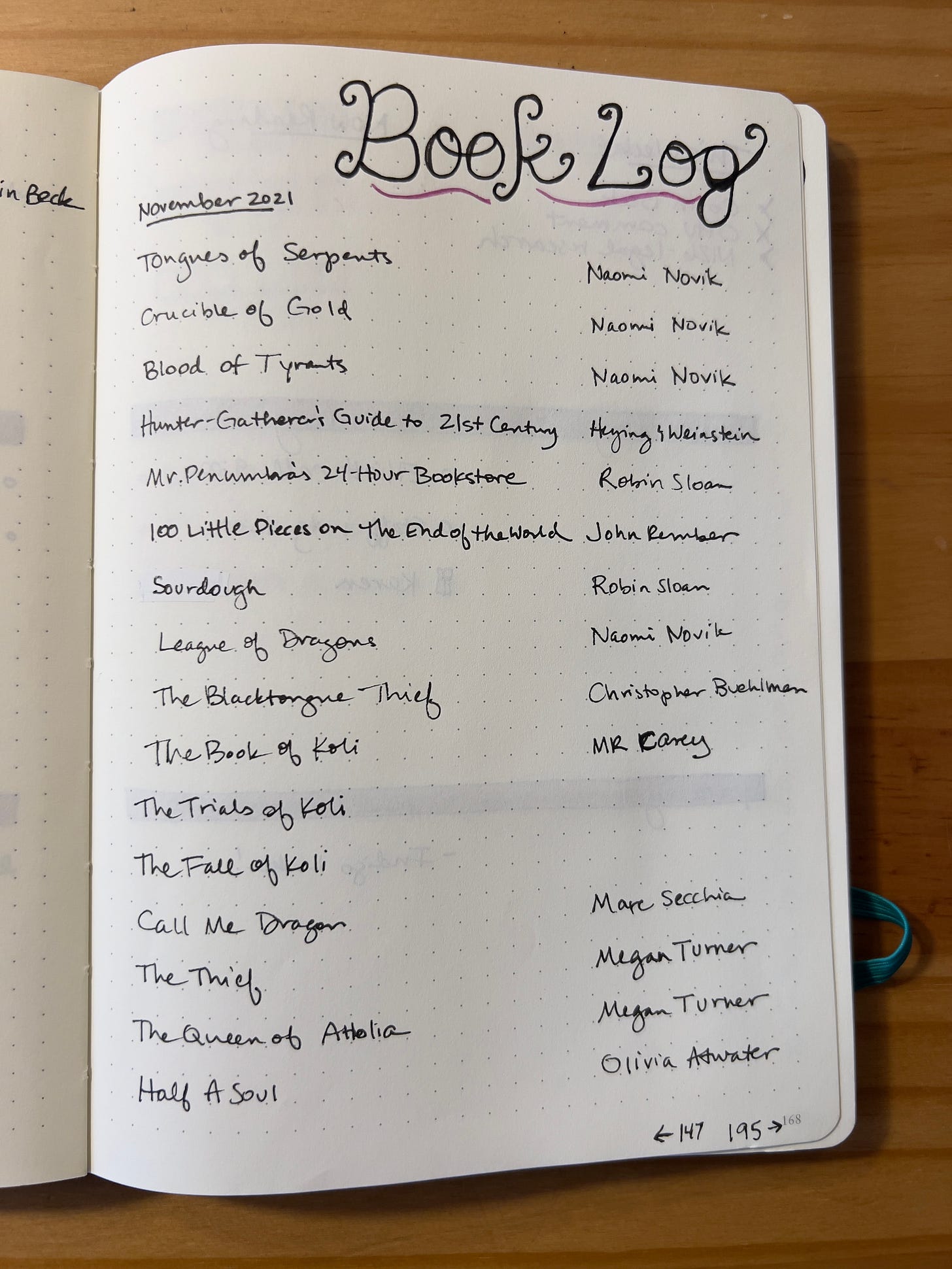
As a lawyer, part of my job is to read hundreds of pages of court cases or administrative records each week for written analysis. So I had no problem reading a large volume of books in my free time, as long as they didn’t require any “work” whatsoever. If they did, I’d give up, and return to the easy, sweet book series I enjoyed (or worse, I’d while away the hours on social media).
For me, that sweet book candy comes in the form of genre fiction: sci-fi, fantasy novels, and spy/military thrillers. Preferably, ones that come packaged in a series I can binge like TV. I like action. I like adventure. I could load a fiction series on my Kindle and blaze through the entire thing in a few days.
Looking back at my journal for September 2020-December 2021, I see that most of what I read resembled the following:
The Stone Sky, The Obelisk Gate, The Fifth Season by NK Jemisin
The Murderbot series by Martha Wells
The Temeraire series by Naomi Novik
The Book of Koli series by MR Carey
These are good fantasy and sci-fi books. Still, the first thing the bullet journal showed me was that while I was reading a lot—well over a hundred books every year—most of it was not aimed at my intellectual growth.
The second thing hit me when I saw, written there in my own handwriting, that I was doing all my reading on the Kindle app on my phone. All of it. I was logging several hours of screen time each day, and almost all of that was the Kindle app. I didn’t read a single book on paper in 2021.
My first move was to ask for a Kindle Paperwhite for a holiday gift, and I started 2022 by deleting the Kindle app from my phone (I got rid of Facebook and Instagram, while I was at it). That solved the phone part of the problem.
Next, I decided to introduce one “hard” book each month. It would be in hard copy, nonfiction, and I would take notes.
In January, I started with Immune: A Journey into the Mysterious System that Keeps You Alive. A biology major, I’d taken immunology as an undergrad and loved it, but wondered if I still remembered anything. An immunology book for laypeople seemed just the thing.
It was hard. I mean, many people would not think so, but for me, weak from my phone-based, easy-reading habit, reading this book for retention was hard. Reading a physical book was hard.
It was a hardback. It was heavy. I kept putting it down to pick up my phone. My hand muscles preferred scrolling to holding an unwieldy book.
And taking notes. That was really hard. I’d never taken notes for pleasure before; only for work or school.
It paid off, though. For a fair portion of the thousands of fiction books I have read in my life, I cannot remember one character’s name or a single event from the plot. I look back now at titles I read in 2020 or 2021 and don’t even remember reading some of them. And when I did read nonfiction, I’d comprehend it, but I rarely retained anything.
Thinking back to Immune almost three years later, though, I can recall quite a bit. With a review of my notes, I could probably give a reasonably accurate one-hour lecture on basic immunology for, say, a non-medical/non-scientific audience.
Maybe I’m overstating it. Still, that I can recall without any reference to my notes the basic structure of innate immunity versus adaptive immunity, and that one reason measles is much worse than people give it credit for is that it frequently causes immune amnesia, is nothing short of astonishing to me. I thought my pleasure-reading recall was broken, irreparably. Turns out, the problem was that I hadn’t been reading for retention.
When I started this in January 2022, I didn’t have any way of knowing that reading “hard” books on paper and taking notes would result in much improvement. I just knew I had to get off my phone. It’s only now, two years later, that I can sense the magnitude of the difference.
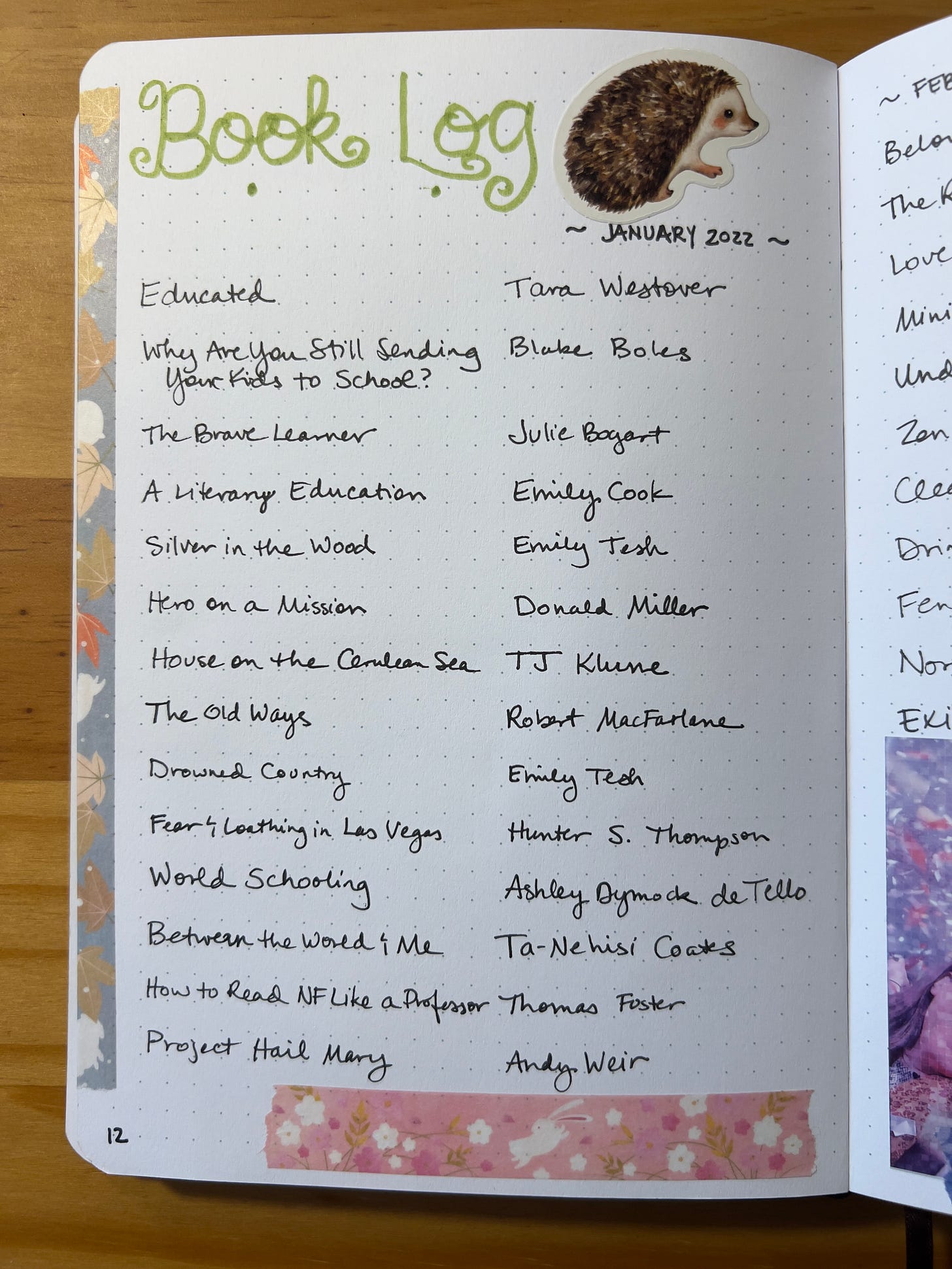
I went on to “assign” myself more challenging reads through 2022. At some point, I read Thomas C. Foster’s How to Read Nonfiction Like a Professor and thought I’d try to get through some of his recommended reading lists. That’s how I ended up doing Fear and Loathing in Las Vegas and All the President’s Men. From reviews by other writers I enjoyed, I hit up The Old Ways by Robert MacFarlane and Beloved Beasts by Michelle Nijhuis.
More nonfiction from 2022:
Drinking Molotov Cocktails with Gandhi by Mark Boyle
Ten Equations that Rule the World by David Sumpter
Breaking Bread with the Dead by Alan Jacobs
Eager by Ben Goldfarb
Nature’s Best Hope by Doug Tallamy
I took extensive notes on most of these and felt I was starting to get a handle on quality nonfiction work. But my fiction choices still needed some thought. Through most of 2022, I was still reading several spy thrillers in a row, or maybe bingeing a mediocre post-apocalypse series, zooming through seven books in a week. At some point, I decided to try some more challenging literature.
My notes show that in mid-2022 I came across Blacktop Wasteland by S.A. Cosby. I don’t remember why I decided to read it: it was so far outside my usual wheelhouse; it was Americana, and set in the everyday world. Unappetizing as a stale saltine, or so I thought.
I was wrong. Just so wrong. I loved it. I was swept up; I can still remember the characters and the story here at the end of 2024. That car, that convenience store lot, that man: born to be a getaway driver.
I also can’t remember how I found Peter Heller, but it looks like I read The Guide and then shortly went on to read The River and The Painter. I loved those books. By the time I finished another S.A. Cosby book, Razorblade Tears, I knew I liked a wider range of fiction than I’d believed.
But although I was beginning to understand I had the capacity to enjoy different types of fiction, I still felt I had no good way to judge what books constituted quality literature. So I hit on the idea of reading Pulitzer Prize and Booker Prize winners, and then thought I’d tackle the Washington Post’s Ten Best Books list.
Looking through my reading for 2023, I can see that I was reading a lot more nonfiction, still some spy series (lots of Gray Man), and now some Pulitzer and Booker Prize winners. That’s how I got into Donna Tartt, Richard Powers, Barbara Kingsolver (though I’d read her older stuff decades before), Colson Whitehead, Hernan Diaz.
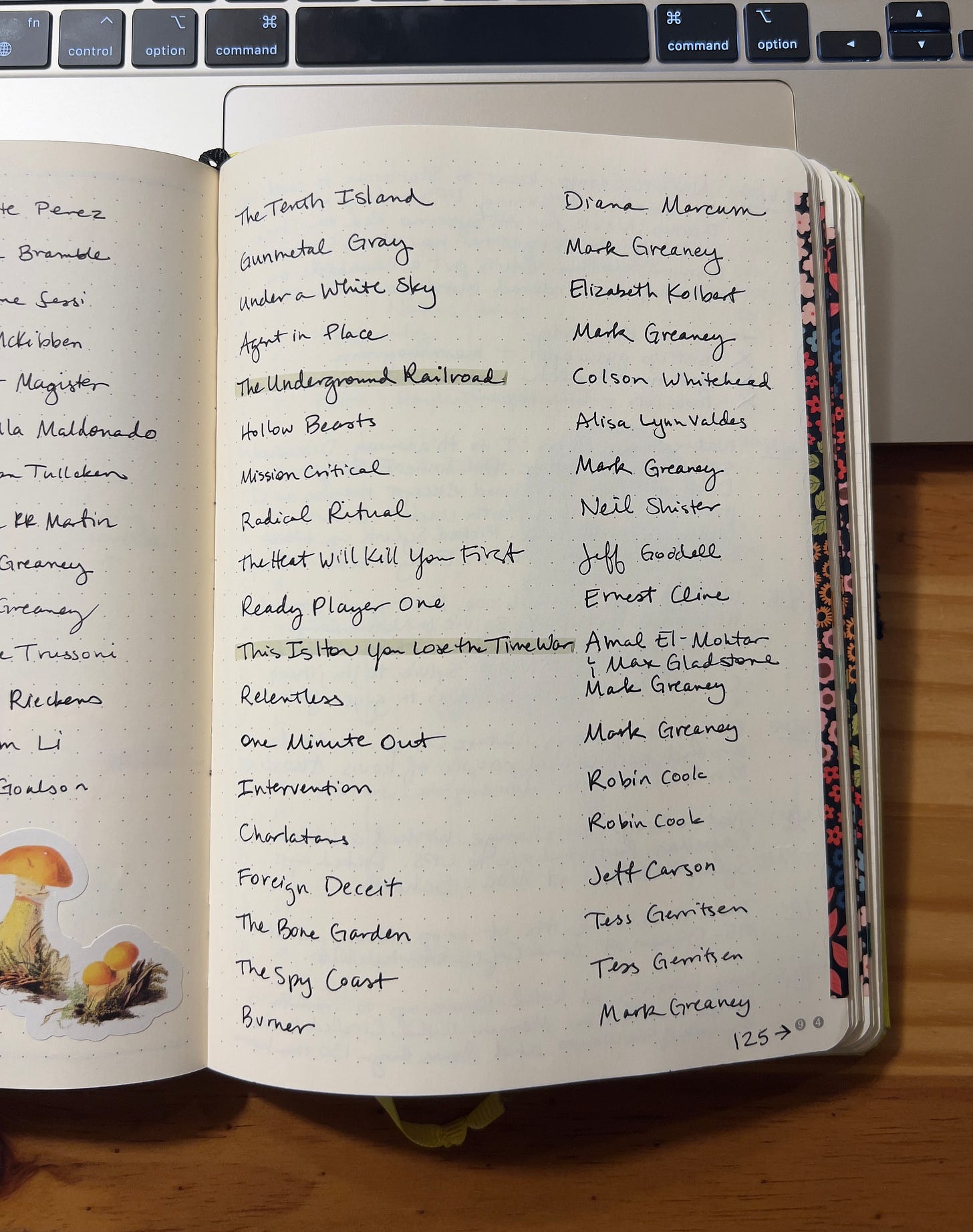
Some of it I loved (Demon Copperhead, Trust); some I did not (The Goldfinch). But by the time I powered through Yuval Noah Harari’s Sapiens in softcover by 2023’s end, I knew I could read big, paperbound books again.
Then I came across a couple of articles written to share personal reading curricula. Ted Gioia’s “My Lifetime Reading Plan” was just what I needed. I’d spent the last couple of years proving to myself I could read and retain challenging nonfiction and prizewinning literature (even books I didn’t love). Now it was time to work toward my own intellectual growth, steering it purposefully toward works that explored the bigger gaps in my knowledge and some of the lifetime mysteries I’m dealing with.
My reading curriculum is nowhere near as rigorous as Gioia’s. And he was precocious enough to start his as a teenager; here in middle age, I’m a bit behind that particular curve. But as I’ve learned, it’s never too late to open your mind.
Razib Khan’s piece “Your brain on books: themed readings lists for a 20-page-a-day habit” helped immensely too.2 Gioia helped me figure out a framework for a curriculum. Now, with Khan’s process, I had a method.
So, for 2024, I decided to read pages, rather than books. I set up a planned book list, titles divided among a few nonfiction themes plus fiction books I thought were more literary than my usual fare. I listed each book’s page count. I planned to read 50 pages a day, which is 18,250 pages in a year.
I joined Simon Haisell’s slow read for Wolf Hall and its sequels. A yearlong reading group, it works through all three of Hilary Mantel’s Cromwell novels together. To me, these were quite challenging literature. I thought: if I can really read and understand these books, then maybe the following year, I can try War and Peace.
I started my new curriculum on January 1, 2024. For the first several months, I stuck to 30 pages of fiction a day, and 20 pages of nonfiction. I tried to read paper books whenever possible. Sometimes a book was only available in my library’s online Libby system, or free on Kindle Unlimited, so I’d read it on my Paperwhite rather than ordering a physical copy. Still, I came to prefer reading paper books.
The fiction pages were usually pretty easy. Even Wolf Hall—which had so intimidated me—was a treat, given Haisell’s guidance.
Some days it was hard to read 20 nonfiction pages on paper, though, because I didn’t allow myself to read casually. I wanted to retain something. For most NF books, I highlighted and took notes. Sometimes I missed a few days. I’d make those up with long reading sessions on the weekend.
I admit for the first few months, I often saw reading as a chore. For a while, I even added some handmade calendars to my bullet journal to track whether I’d done my assigned pages each week.
But by early summer, I no longer had to force myself to read a set number of pages per day. I found myself picking up a paper book instead of my phone in idle moments; I was easily on pace to meet my target of 18,250 pages (50 a day) for the year. The spirit of the bright-eyed girl I once was, with her nose in a book at every free moment, had returned to replace the tired woman with her eyes hollowed out by the light of a tiny blue screen.
But more than that, I came to love books again. I remembered the old magic of meeting a new set of people in the pages of a story. I fell hard for Hilary Mantel. Where Donna Tartt left me cold, Mantel set my soul on fire. I don’t have the words to describe what her writing is like, but it’s a marvel to me that a human could string together words like that.
Midyear, I decided to join a Lord of the Rings book group to reread a favorite from my teenage years. Would the magic of Tolkien’s books still be accessible to a middle-aged person jaded from having read nigh on every fantasy series that followed in his footsteps? Could I still immerse myself in his lingering landscape descriptions, his curlicue prose, his endless elven songs?
Yes. God, yes. I kept reading ahead of the group because I couldn’t will myself to put the book down. It’s still such a page-turner—all 1,031 of them.
In fiction, in addition to Mantel and Tolkien, 2024 brought me John Irving, Neil Gaiman, Samantha Harvey, Cormac McCarthy, Percival Everett, Lauren Groff, James McBride, Octavia Butler. I loved each of them in different ways.
In nonfiction, my 2024 TBR lists covered a few themes that are relevant to my interior journey as well as my writing work:
Biophilia
Deep time and evolution
Humans and history
America and its lands
Guidance for life
I read several books in each category. If anyone’s curious, they’re all in this spreadsheet (there’s a 2024 and a 2025 tab at the bottom).
I asked the Biblioracle (author John Warner, books columnist at the Chicago Tribune) for a couple of fiction recommendations and was granted Everett’s The Trees and Margaret Atwood’s Oryx and Crake, both of which permanently levered open my mind.
For 2025, I’ve put together an initial curriculum (click on ‘2025’ tab). In nonfiction, it’s a continuation of some of the themes I explored in 2024. I’m particularly excited to start into Peter Frankopan’s catalog of world history tomes and read a few types of American histories—indigenous history, legacy of slavery, and history of empire, in particular—to set my mind straight on how my home country got this way as it descends into the madness of Trump II.
I’m planning to re-read Ruth Allen’s Weathering. Her book sat me down to have a word. I could only read one chapter at a time, then I had to stare into space for awhile after; I highlighted so much wisdom in its pages, I might as well have highlighted the whole thing. So I need another round with it, to see how I might be changed this time.
For fiction, I’m going to start with several books that are already on my shelf asking to be opened. These include a couple by Tom Cox, Robin Sloan’s new one, and one of Brian Doyle’s. I’ll likely bug the Biblioracle for at least one more recommendation next year.
I’ll be doing Haisell’s 2025 slow read series which includes A Place of Greater Safety by Mantel, The Siege of Krishnapur by J.G. Farrell, Things Fall Apart by Chinua Achebe, and Penelope Fitzgerald’s The Blue Flower.
And I think I’m going to try War and Peace in 2025.
📚
In 2021, I read 105 books.
In 2022, I read 126 books.
In 2023, I read 121 books.
Here at the end of 2024, my hands shook as I typed The Mirror and the Light into my spreadsheet, marking the Cromwell series as complete and officially putting me over my page goal for the year.
My hands didn’t shake because I’d just achieved a goal I feared I couldn’t meet. No, they shook because I’d just journeyed through death with Thomas Cromwell and realized how much I will miss him now he is gone. How will I survive 2025 without his endlessly sorting papers at his desk, shipping crates of fruit to various colleagues, and adopting scruffy kids and castoff royal pets while eyeing bolts of fabric from the latest Low-country textile shipment?
I guess this is what great books do to you. They inhabit your days.
In 2024, I read 69 books. And I finally learned how to read again.
I know there is privilege inherent in having time to read like this. And yet, I find I have more time to read now than ever, despite running my own business and two Substack publications as a full-time homeschooling mom to a special-needs kid while dealing with my own chronic illness (whew). I rarely watch videos anymore, because they trigger my migraines. That, plus having evicted social media from my life, means I’ve been amazed at the sheer number of free hours available to me these past couple of years, compared to previous decades.
I have the vague sense I am not in alignment with Khan’s views on certain issues, but I am not planning to dig through his lengthy, dense work to parse what those might be; that is to say, this is not an endorsement of his worldview but a giving of credit where it’s due. His reading framework was beyond helpful to me this year.





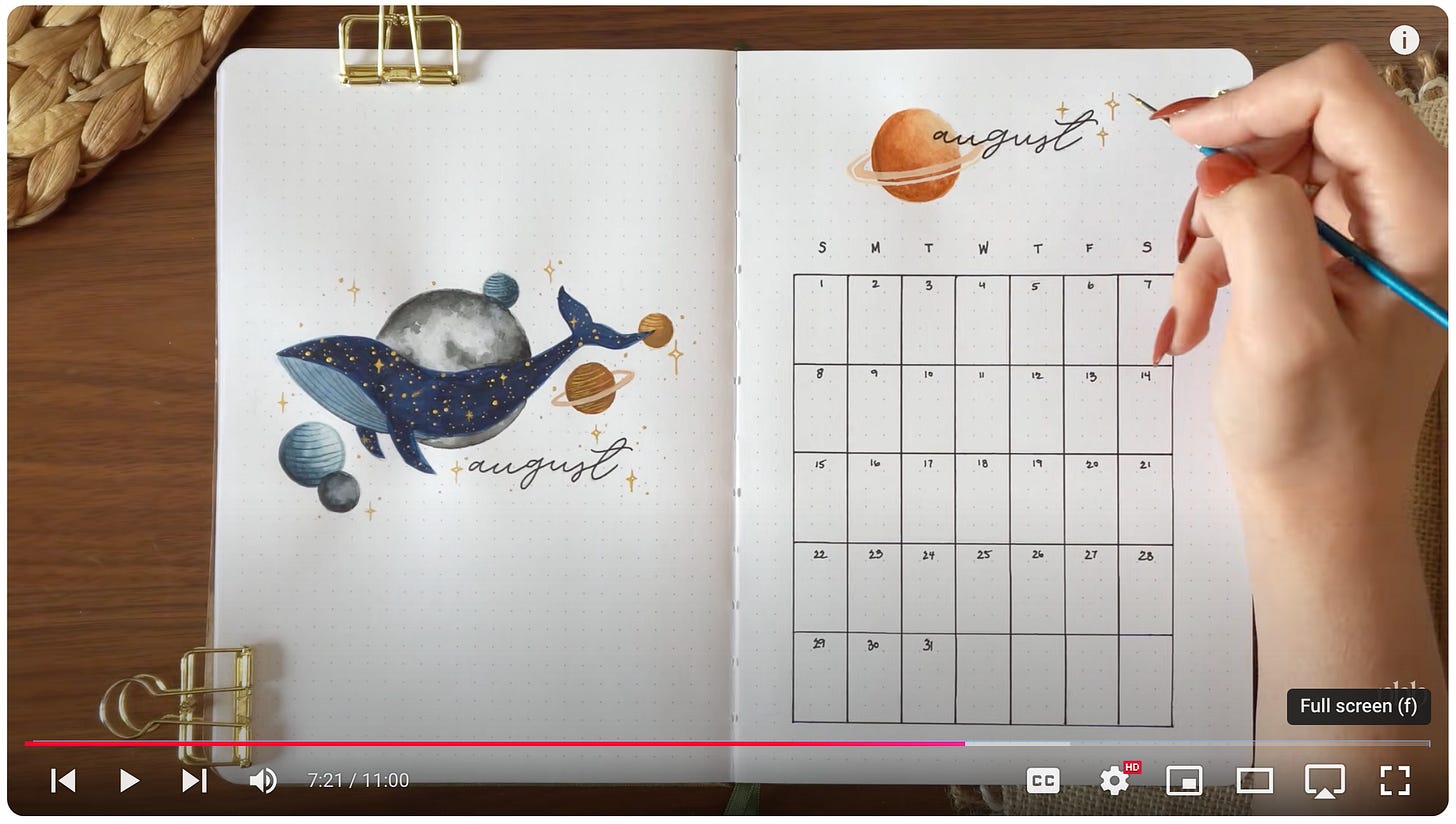
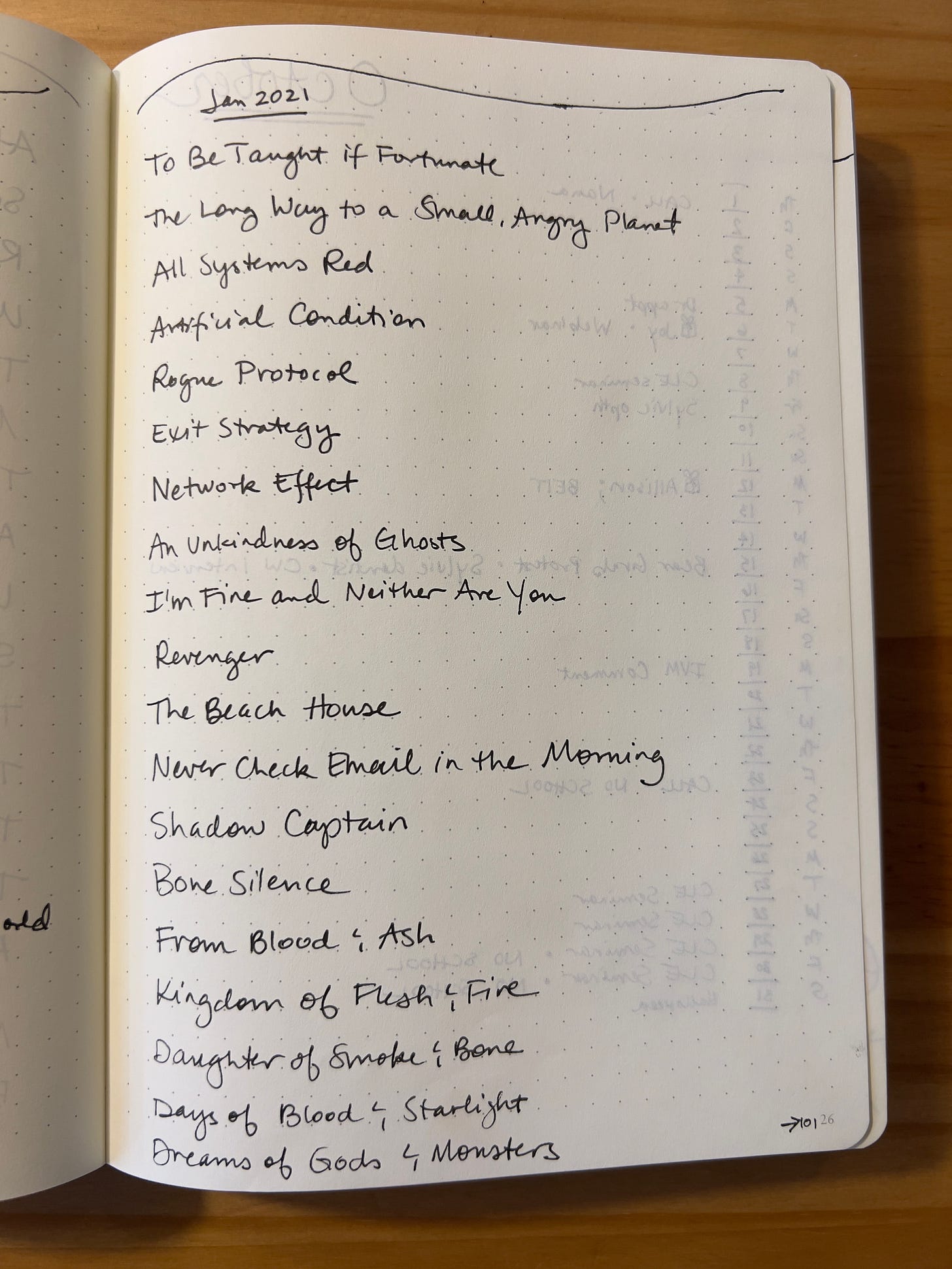
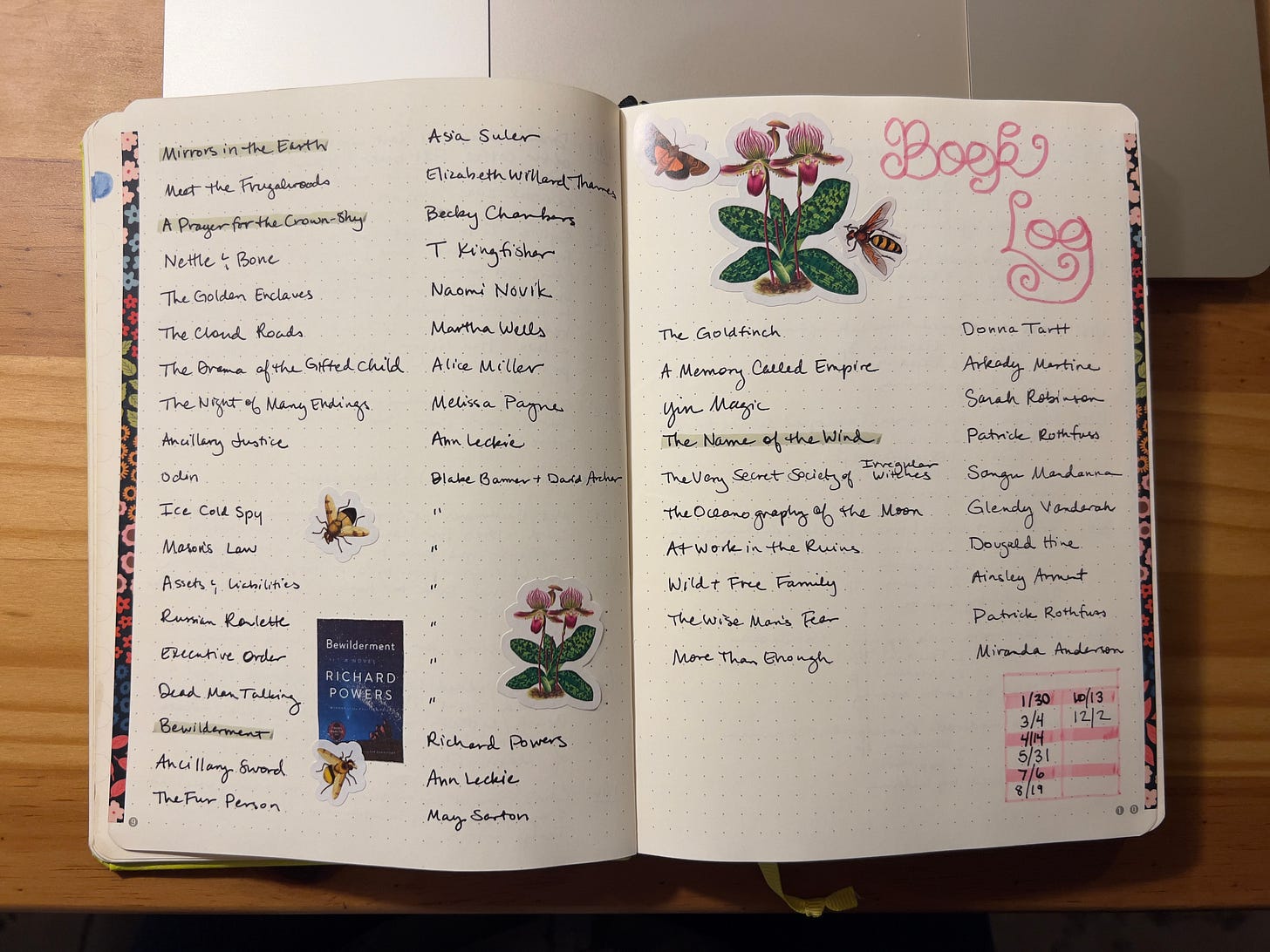
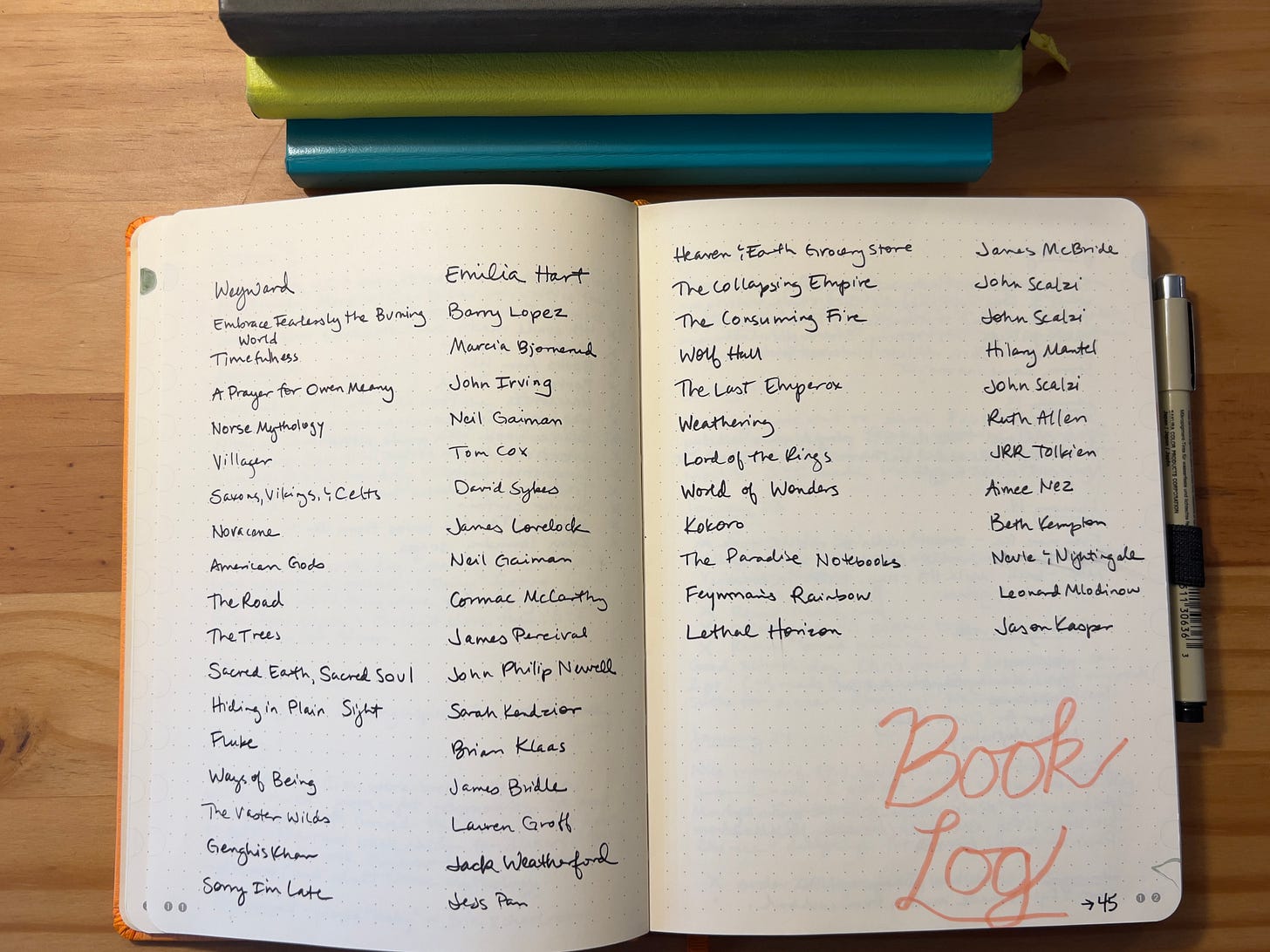
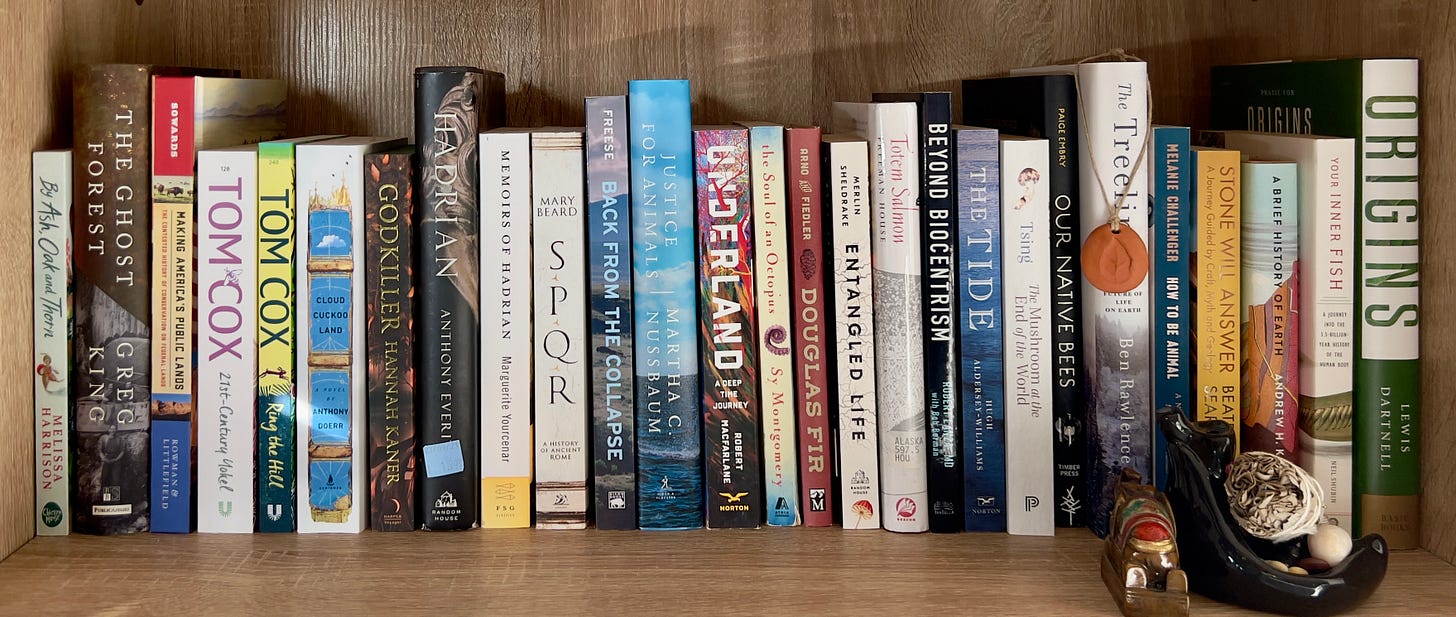
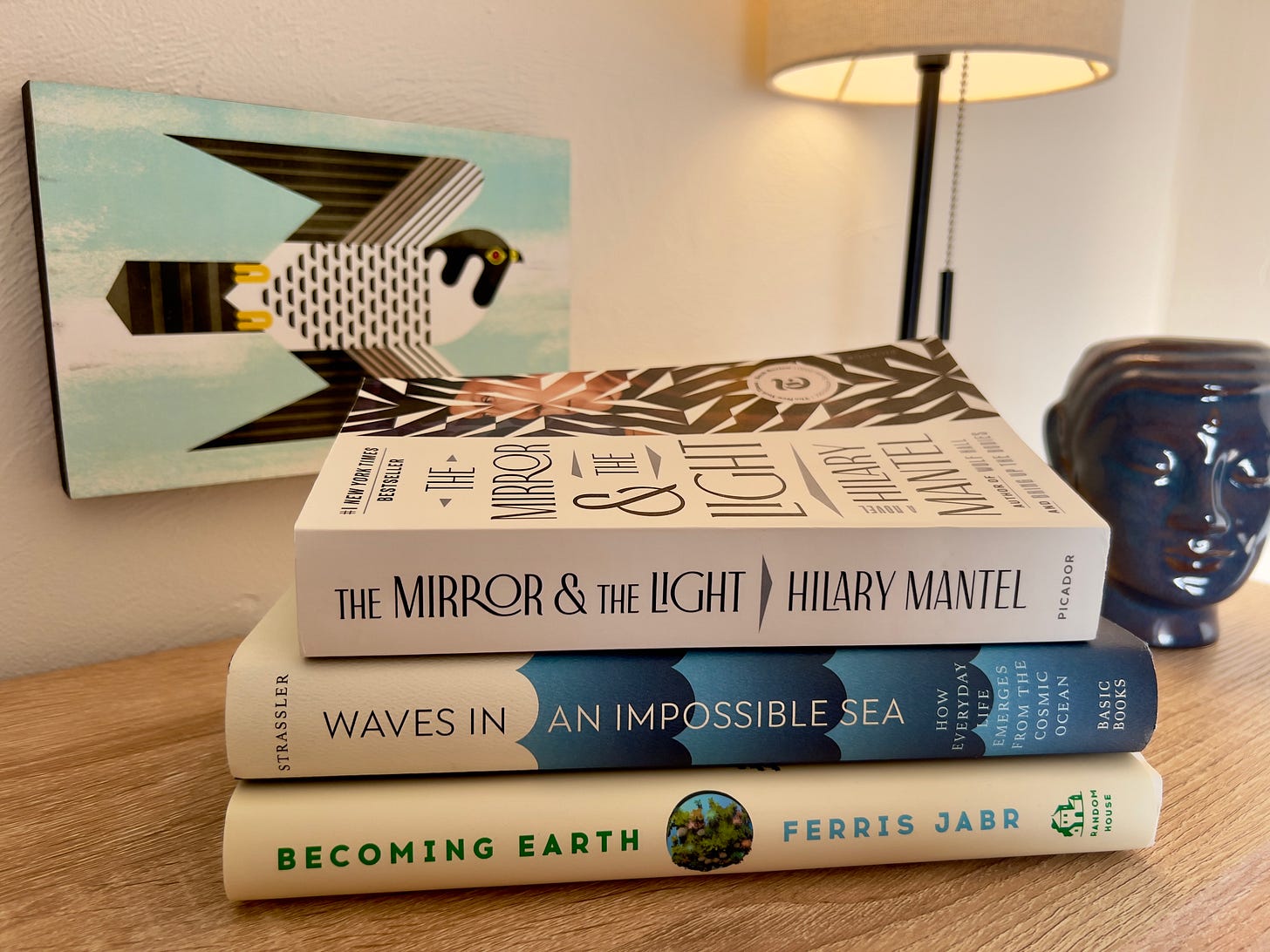
This gives me hope that I, too, can learn to read again. Thank you.
VERSO BOOKS End of Year Sale
Save up to 40% on all print books and 80% on all ebooks until January 1st.
https://www.versobooks.com/
I can't stop myself and put one book after the other into the shopping cart. What a treasure trove!